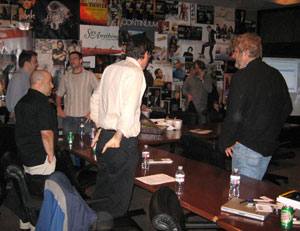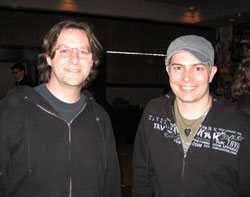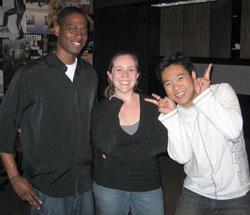April Game Deconstruction Group Examines Call of Duty 4 and Portal
4/1/2008
 The Game Deconstruction Group examines the most critically and commercially acclaimed video games in order to answer the question: what makes great games great? At the group’s most recent gathering hosted by Sony Computer Entertainment Santa Monica on April 10th, game makers gathered to discuss two of this year’s multiple Interactive Achievement Award winners: Infinity Ward’s Call of Duty 4: Modern Warfare and Valve Software’s Portal. The attendees, consisting of designers, artists, programmers, and producers from game companies across Southern California, got to bottom of the issue during an evening of food, laughter, and good-natured debate.
The Game Deconstruction Group examines the most critically and commercially acclaimed video games in order to answer the question: what makes great games great? At the group’s most recent gathering hosted by Sony Computer Entertainment Santa Monica on April 10th, game makers gathered to discuss two of this year’s multiple Interactive Achievement Award winners: Infinity Ward’s Call of Duty 4: Modern Warfare and Valve Software’s Portal. The attendees, consisting of designers, artists, programmers, and producers from game companies across Southern California, got to bottom of the issue during an evening of food, laughter, and good-natured debate.
University of Southern California game design students Andre Clark and Al Yang opened the evening with Call of Duty 4: Modern Warfare, arguably the one of the most cinematic and atmospheric video games released to date. GDG participants agreed that Call of Duty 4 provides the player with a level of immersion seldom achieved in video games.  Presenters and attendees agreed that effective use of art direction, level design, special effects, and game play engineering mask somewhat linear game play to create a convincing illusion of choice and open-world freedom. Other subtle details such as initial weapon load-out outs and cues from A.I. team members let players better understand the numerous roles they can play throughout the game’s various scenarios. Infinity Ward’s Brent McLeod and David Johnson were present bringing their insights into Call of Duty 4, including its online multiplayer component, a player-versus-player competition with a finely-balanced reward and customization system built into it which received recognition as one of the highlights which keeps players coming back for more.
Presenters and attendees agreed that effective use of art direction, level design, special effects, and game play engineering mask somewhat linear game play to create a convincing illusion of choice and open-world freedom. Other subtle details such as initial weapon load-out outs and cues from A.I. team members let players better understand the numerous roles they can play throughout the game’s various scenarios. Infinity Ward’s Brent McLeod and David Johnson were present bringing their insights into Call of Duty 4, including its online multiplayer component, a player-versus-player competition with a finely-balanced reward and customization system built into it which received recognition as one of the highlights which keeps players coming back for more.
USC game design student Diana Hughes concluded the evening’s discussion with her presentation on Portal, an unconventional first-person puzzle game based primarily around the manipulation of space and objects. Portal’s challenges, while simple on their own, present complex and thoughtful puzzles when considered in unison. The union of a well-defined set of game rules and a hint of comedy (provided by Portal’s darkly humorous and homicidal A.I. antagonist GlaDOS), creates a rich, distinctive experience which can be enjoyed and completed in a matter of hours. GDG attendees noted how Portal became an instant classic upon its release, demonstrated by the numerous fan-made music videos, animated shorts, home-made crafts, and even cakes that were offered as praise for a job well-done.
 Through their passion for creating and understanding video games, the GDG attendees reasoned that shorter games can not only be commercially successful, but change the way we play and think about video games.
Through their passion for creating and understanding video games, the GDG attendees reasoned that shorter games can not only be commercially successful, but change the way we play and think about video games.
The Academy once again extends its thanks to the USC game design students for their informative and detailed presentations, and to the attendees for their insights, enthusiasm, and participation.
Copies of the students’ presentations are available upon request. To request a copy of the presentations, or to be added to the Game Deconstruction Group mailing list, please contact Terrence Myers.